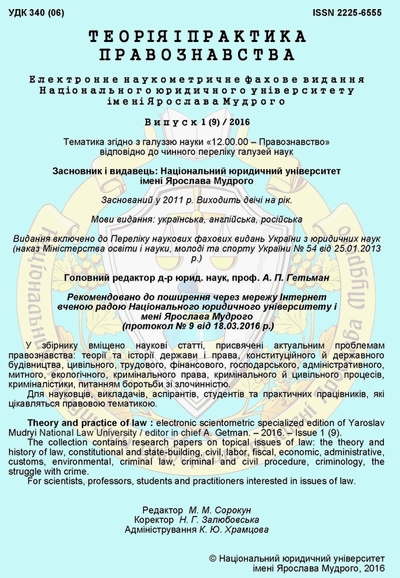Legal doctrine, scientific community and government: some questions of correlation and interaction
DOI:
https://doi.org/10.21564/2225-6555.2016.1.64208Keywords:
legal doctrine, legal science, scientific community, government, legal practiceAbstract
Problem Setting. Legal doctrine is an integral part of any developed legal system, where class of professional lawyers has been formed, complex of special legal texts has been created and there are professional legal practices secluded from other spheres of social activity. At the same time, the degree, forms and a legal doctrine intensity of influence on processes of state and law-making, the development of society as a whole depend on the state of the development of the legal system, existing legal traditions and the character of the sources of law system. As known, the legal doctrine is created, reconstituted, developed as the result of intellectual and creative efforts of the professional community of lawyers (primarily scientists-lawyers), that always are in the specific economic, legal, cultural and political conditions. Substantial filling of the results of scientific researches, necessity in them and implementation in legal practice one way or another depend on power, in particular, the existing state and political regime. These and relevant to them questions have not been investigated sufficiently till now in Ukrainian jurisprudence, are acquiring actuality for the Ukrainian legal system, large-scale reforms of which are to be provided on the scientific grounds. This, in its turn, causes the necessity in revision or reconsideration of the role and significance of scientific legal community in contemporary national state and society.
The actuality of the topic. The main purpose of the article is conducting analysis of foreign and domestic (Soviet) experience of the interaction between the scientific community and power, revealing of peculiarities (intensity, form) of influence of the latter on a legal doctrine formation.
The purpose of the article. On the European continent attitude to public authorities and the scientific community legal doctrine has not always been positive: it had been changing from recognizing doctrine at the official level as source of law, for example, in Ancient Rome, until its denial in some periods. Sometimes authoritarian regimes had been trying to control, or even subordinate the development of scientific thought, educational and cultural space. At last, conclusions from the negative experience have been done and came the realization that such a policy is not only harmful but also dangerous. Today, in the western law orders the results of scientific research have been accepted by the state and legal practice in connection with deep, thorough and objective cognition of the essence of the state-legal phenomena and processes and revealing of regularities of their origin and development. The basis of such researches are methodological pluralism, real scientific discussion, free exchange of ideas, which is a prerequisite of working out of effective and useful to society scientific conclusions and proposals. Only a productive dialogue between the authority and lawyers, the existence of a free market of ideas, freedom of scientific creativity, independence of the academic community which is to be recognized and protected by the state and it is under such conditions working out of effective and useful to society scientific provisions is possible. Such dialogue, as it is known, is possible only in the case when subjects interact on an equal partnership footing, excluding the service function of legal science and the implementation of it by representatives of «political orders».
Conclusions. If you analyze the Soviet period, the interaction between the scientific community and power, which has always strictly controlled all spheres of socio-political and legal life (except for short phase of liberalization of state policy), resembling moving of one-way street. From time to time the street name has been changed, but the rules and basic approaches were without any changes. Adding, that government dictated (most frequently) to the science and its representatives which questions and problems must be investigated, what to be criticized and what ideas are to be supported and which to be denied and rejected. Therefore, we can make the conclusion that, as a whole, the legal doctrine under such conditions was just being created by power but by the «hands» of lawyersReferences
Baturina, S.V. (2008). Tradicii rossijskoj pravovoj doktriny. Krasnodar [in Russian].
Vishnovec’ka, S.V. (2002). Doktrina trudovogo prava. Erlіhіvs’kij zbіrnik 3, 37–45 [in Ukrainian].
Voplenko, N.N. (2004). Istochniki i formy prava. Volgograd: VolGU [in Russian].
David, R. (2009). Osnovnye pravovye sistemy sovremennosti. Moscow: Mezhdunarodnye otnoshenija [in Russian].
Kabrijak, R. (2007). Kodifikacii. Moscow: Statut [in Russian].
Lazarev, V.V. (2013). Juridicheskaja nauka: sovremennoe sostojanie, vyzovy i perspektivy. Lex russica, 2. Retrived from: http://www.center-bereg.ru/l524.html [in Russian].
Lezhe, R. (2010). Velikie pravovye sistemy sovremennosti: sravnitel’no-pravovoj podhod. – Moscow: Wolters Kluwer [in Russian].
Mizes, L. (2009). Teorija i istorija: interpretacija social’no-jekonomicheskoj jevoljucii. – Cheljabinsk: Socium [in Russian].
Mihajlov, A.M. (2012). Genezis kontinental’noj juridicheskoj dogmatiki [The genesis of the continental legal dogmatics]. Moscow: Jurlitinform [in Russian].
Pankratov, I.F. (1962). Razvitie nauki kolhoznogo prava v SSSR (1929-1938). Jurisprudence, 2. Retrived from: http://www.law.edu.ru/article/article.asp?articleID=1129411 [in Russian].
Poljakov, S.B. (2014). Juridicheskaja nauka, praktika, politika. Lex russica, 4, 413–420 [in Russian].
Sorokin, V.V. (2010). Obshhee uchenie o gosudarstve i prave perehodnogo. Moscow: Jurlitinform [in Russian].
Tacіj, V.Ja. (2002). Metodologіchnі problemi pravovoї nauki na etapі formuvannja pravovoї, demokratichnoї, socіal’noї derzhavi, 3–13 [in Ukrainian].
Downloads
Published
How to Cite
Issue
Section
License
Copyright (c) 2016 Теорія і практика правознавства

This work is licensed under a Creative Commons Attribution 4.0 International License.




